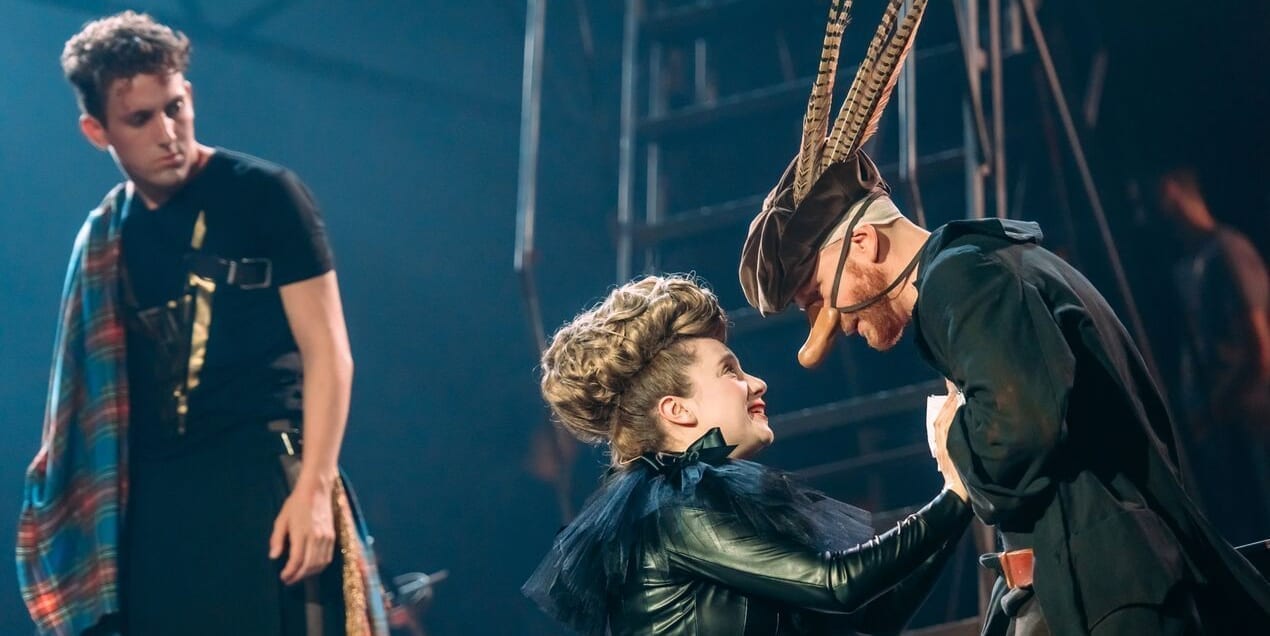Cyrano de Bergerac (Brian Ferguson) is a swashbuckling man, a lover and a fighter, a poet and a soldier. He also has a very large nose. It is this nose that stops him confessing his love for the accomplished and beautiful Roxane (Jessica Hardwick). Instead, Cyrano finds himself pressing the suit of another, Christian (Scott Mackie), using his poetic flair to help the handsome but inarticulate soldier win Roxane.
The play Cyrano de Bergerac was written at the end of the nineteenth century, and has enjoyed a long and rich theatrical life since. It has been repeatedly translated, and its nasally over-endowed lead has been played by a host of prominent actors. The version currently on at the Lyceum is a Scots translation, first performed in 1992.
Scots is a beautiful and lyrical language. The Lyceum’s recent fantastic production of The Winter’s Tale featured an entire second half translated into Scots, and it was a riotous, poetical success. In Cyrano there are flashes of the beauty in the language, and the rhythm of the Scots rhymes sometimes comes through.
Unfortunately, most of the time those rhymes and rhythms are impossible to hear. The play is reasonably long, clocking in at a little over two and a half hours, and it feels like the cast are rushing through their lines in a desperate effort to stop it from being any longer. Added to the frequent loud music, dashes of French and somewhat chaotic staging, this makes large parts of the production almost entirely incomprehensible.
For those who don’t know the plot, this is problematic, especially as sections of the play are a little obtuse anyway. As the first act ticks past the hour mark, those struggling to keep upstart to lose interest, and the play never really grabs them back.
The staging doesn’t help matters either. It is chaotic and rushed, rather like the script. Even the Lyceum’s usually faultless sets stumble slightly, falling into the trap of being too obvious a metaphor, rather than simply augmenting and aiding the performance.
There are a couple of well-done scenes. The opening fight is choreographed with all of the elegance of a ballet, with words and swords breathlessly twirling around each other. The bleakness of the monochrome final scene is heavy with melancholy and sorrow, although it does end up rather dragging on in the end.
Ferguson certainly gives his all as Cyrano, filling him with bold, charismatic energy. He careers around the stage, sometimes drooping and lovelorn, sometimes upright and roaring. The mask he wears of a swashbuckling fighter rests uneasily over the tortured poet beneath, and Ferguson lets us see through it frequently enough to give the character some depth. Hardwick’s Roxane is also well played, a wilful, loyal and flirtatious figure, although the meaning of her sharp dialogue is sometimes lost in the torrent of Scots.
These positive points cannot rescue what is ultimately a bit of a chaotic mess of a play. This production of Cyrano de Bergerac would benefit considerably from being cut in both time and content, allowing the language and performances time to breathe. As it is, it is a rather unsatisfactory piece of work, which lets itself be hindered rather than liberated by its Scots translation.

